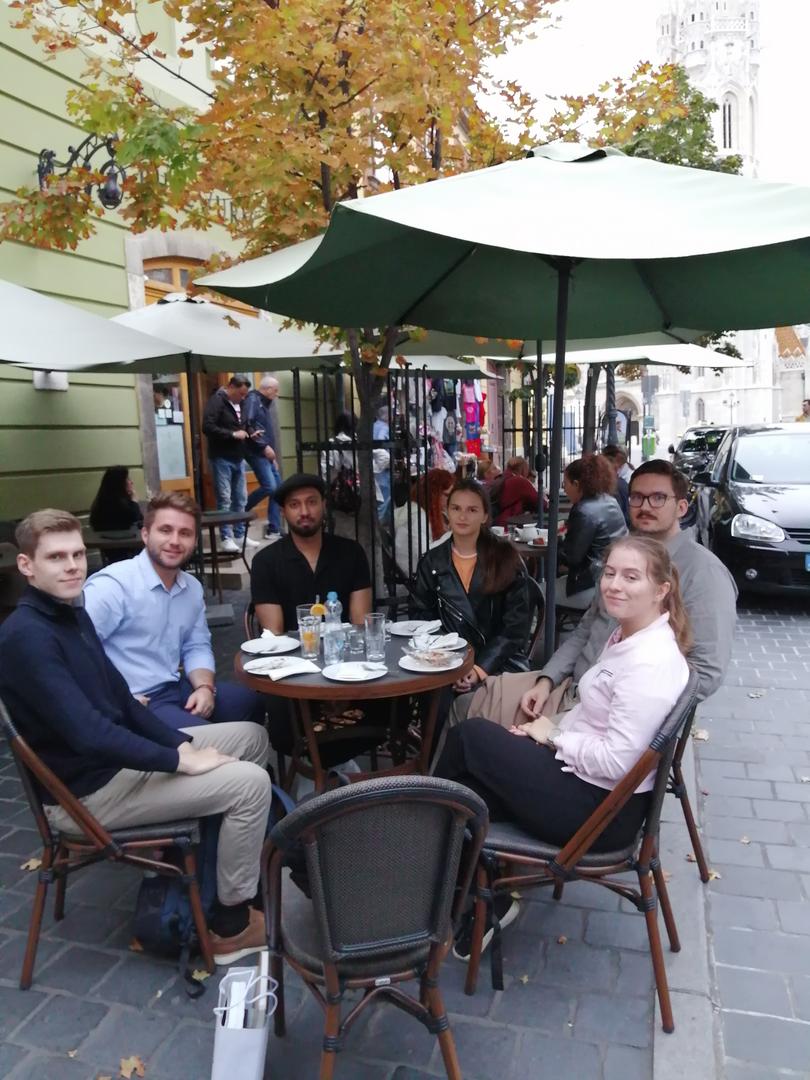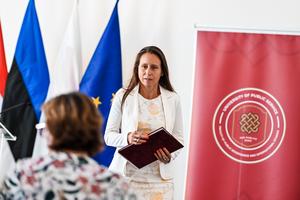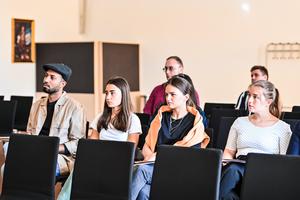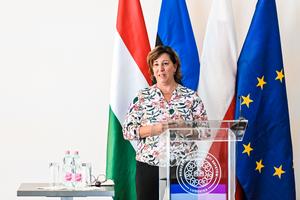"It was amazing!" was the unanimous opinion. The praise goes well even if it happens to be addressed to the poppy seed cake eaten in the famous pastry shop of the Buda Castle. Because, fortunately, the feedback from the participants expressing their overall impressions of the one-week CASPA Summer University was using the same words with which they lauded the traditional confectionary “treasures” that were tried during the farewell walk.
The Summer University organized at the National University of Public Service between 12 and 16 of September 2022 was an important milestone in the implementation of the CASPA project, a joint endeavor of three regional partners, Hungary, Estonia and Poland. The original idea of "Cyber Aware Students for Public Administration" (what CASPA stands for), had been developed by the researchers of the Cyber Security Research Institute of the Hungarian National University of Public Service and TalTech, the renowned technical university of the Estonian capital. The basic idea of the project was that the key to the future operation of modern public administration, "e-government", will be how well the government can guarantee the smooth and safe operation of it’s IT-based systems, with the involvement of specially trained “techies”, and also by knowledgeable public sector officials. The basic idea is, therefore that effective "cyber security" is already a wider societal issue.
The CASPA project set itself the goal of developing quite an original curriculum (incorporating innovative technologies and even pioneering pedagogical concepts), concrete teaching materials, and a functioning online training platform, which are capable of providing “ordinary” civil servants (that is public administration officials without specialized engineering, IT, or computer science degree) with an effective tool set of modern "cyber awareness". The two founding father universities were joined by the Kosciuszko Institute in Poland, a well-known regional think-tank for cyber security issues, and a Hungarian-Estonian start-up, cyex.io that develops online solutions, forming thus a very capable consortium for the implementation of the project. Parallel to the progress of the project, the demand for the newly developed curriculum and the emerging new learning materials to be confronted with the comments and suggestions of future users, during a kind of "prototype phase" quality assurance event, had emerged. The Summer University, scheduled for this period in the implementation plan, was actually meant to fulfill this function. The idea was that real students could test some of the already completed segments of the future end product, an educational platform that offers an effective tool for cyber security training for non-engineers in public administration. The one-week CASPA Summer School invited for its complex programme Hungarian, Estonian and Polish students, representing the future user segments.
 The event was opened by Dr. Réka Varga, Dean of the Faculty of Public Governance and International Studies, since the project is managed within the institutional framework of the Faculty. In her opening remarks, she emphasized that governance and public service in the 21st century require the acquisition of new types of knowledge and unusual skill sets. Dr. Ágnes Kasper (manager of the TalTech project staff and also leader of the project as a whole) gave a lecture on the comprehensive issues of cyberspace security and cyberspace normative rules. In the framework of a separate presentation later, she covered the current issues of international regulation related to cyberspace, with particular regard to the normative role of the European Union. Dr. Gábor Nyáry (manager of the Ludovika project team) gave overview of the novel problematics of geopolitics of cyberspace, and then together with his Polish colleague, Ewelina Kasprzyk (head of the Polish project contingent), he presented a panoramic view of the emergent threats in digital spaces, from the application of artificial intelligence to the special forms of cyber challenges in outer space. Dr. Dóra Molnár, also from the Hungarian CASPA team, introduced the students to the typical cyber security strategies of European nations. The societal aspects of cyberspace issues were emphasized in the presentation of Dr. Anna-Maria Osula, a staff member of the Estonian project team, dissecting the major components of multilateral regulations. Later, in a joint presentation with Dr. Nyáry, professor Osula introduced the conceptual framework, operational mechanisms, and international ambient of cyber diplomacy. A particularly sensitive topic was touched upon by a colleague from Estonia, Dr. Pawan Dutt, who looked at the enforcement of rights (ie. privacy issues) in the world of the Internet. His wide ranging presentation was intimately related to the problem area shown by another lecture of Dr. Kasper, lifting the veil off the dark world of cybercrime. In the closing phase of the program, two more practice-oriented topics were covered by members of the Estonian consortium team. Dr. Maria Claudia Solarte gave an online (but still very inclusive and participatory) presentation on the management of cyberspace conflicts, while Aleksi Kajander showed the subtleties of crisis management (very different from the former) through many practical examples. The week’s working schedule was topped by the presentation of Dr. Dániel Berzsenyi, CEO of the digital start-up cyex.io, showing the innovative elements of the online educational platform being built by CASPA.
The event was opened by Dr. Réka Varga, Dean of the Faculty of Public Governance and International Studies, since the project is managed within the institutional framework of the Faculty. In her opening remarks, she emphasized that governance and public service in the 21st century require the acquisition of new types of knowledge and unusual skill sets. Dr. Ágnes Kasper (manager of the TalTech project staff and also leader of the project as a whole) gave a lecture on the comprehensive issues of cyberspace security and cyberspace normative rules. In the framework of a separate presentation later, she covered the current issues of international regulation related to cyberspace, with particular regard to the normative role of the European Union. Dr. Gábor Nyáry (manager of the Ludovika project team) gave overview of the novel problematics of geopolitics of cyberspace, and then together with his Polish colleague, Ewelina Kasprzyk (head of the Polish project contingent), he presented a panoramic view of the emergent threats in digital spaces, from the application of artificial intelligence to the special forms of cyber challenges in outer space. Dr. Dóra Molnár, also from the Hungarian CASPA team, introduced the students to the typical cyber security strategies of European nations. The societal aspects of cyberspace issues were emphasized in the presentation of Dr. Anna-Maria Osula, a staff member of the Estonian project team, dissecting the major components of multilateral regulations. Later, in a joint presentation with Dr. Nyáry, professor Osula introduced the conceptual framework, operational mechanisms, and international ambient of cyber diplomacy. A particularly sensitive topic was touched upon by a colleague from Estonia, Dr. Pawan Dutt, who looked at the enforcement of rights (ie. privacy issues) in the world of the Internet. His wide ranging presentation was intimately related to the problem area shown by another lecture of Dr. Kasper, lifting the veil off the dark world of cybercrime. In the closing phase of the program, two more practice-oriented topics were covered by members of the Estonian consortium team. Dr. Maria Claudia Solarte gave an online (but still very inclusive and participatory) presentation on the management of cyberspace conflicts, while Aleksi Kajander showed the subtleties of crisis management (very different from the former) through many practical examples. The week’s working schedule was topped by the presentation of Dr. Dániel Berzsenyi, CEO of the digital start-up cyex.io, showing the innovative elements of the online educational platform being built by CASPA.
The professional organization of the event (including the wide range of social and cultural activities) was carried out by the Hungarian consortium member, the project staff of the Ludovika Cyber Security Research Institute, led by Dr. Gábor Nyáry, in cooperation with the staff of the Administrative Department and the Development Department of the Dean's Office of the Faculty of Public Governance and International Studies. The basic idea behind the program was that, in addition to the professional programs and presentations, meaning really intensive work, the community-building and cultural transfer elements should also be stressed with almost the same emphasis. Thus, an afternoon’s easy conversation by the Lake of the Orczy-park, or a tour of the Parliament building, including a separate visit to the Parliament Library, or big walks in the Buda Castle, offered ample opportunities for getting together, as well as for learning the cultural - and, of course, culinary values - of Budapest.
Text: Dr. Gábor Nyáry
Photos: Dénes Szilágyi / Dr. Gábor Nyáry


